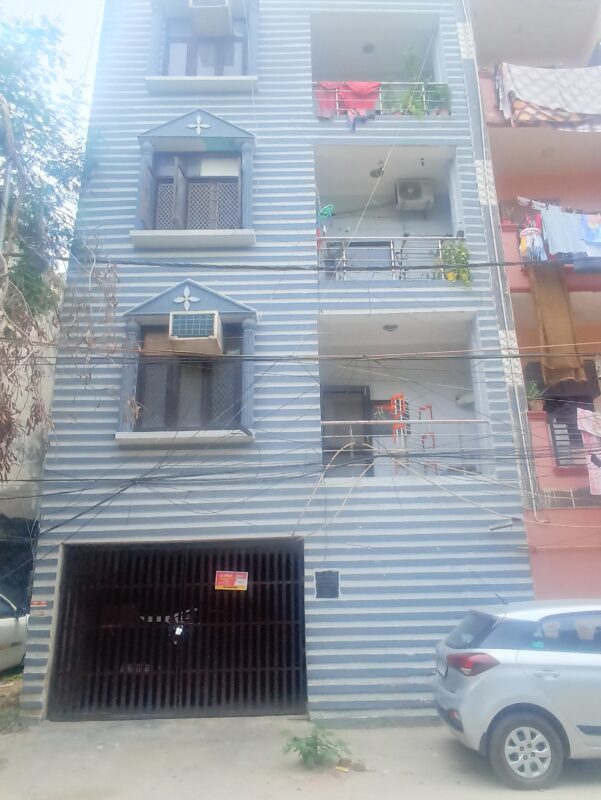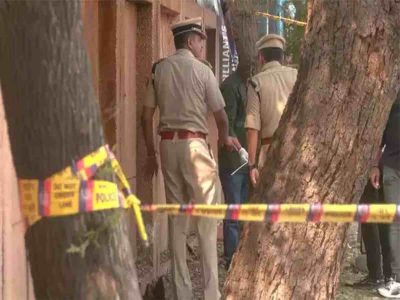A week after the traumatic incident at Dwarka’s Sector-9 colony in which a 10-year-old domestic help was rescued from an employer’s house after allegedly being physically abused for weeks, the girl’s family still remains in utter disbelief about how inhuman anyone can get. The family is still making rounds to the police station to make sure justice is served to their little girl.
The matter came to light when the girl’s relatives swarmed the house of girl’s employers Poornima Bagchi, 33, and Kaushik, 36, and claimed that the child was subjected to multiple beatings over the last two months and left bruised and battered. Poornima is a pilot with IndiGo Airlines while her husband Kaushik Bagchi is a ground staff with Vistara Airlines.
Bothe airline de-rostered the couple soon after the incident.
When news broke out, an angry mob pulled the couple out of their home and thrashed them on the street. The police has arrested the couple and charged the two for assault, burning, grievous hurt under Child Labour Act and JJ Act.
When Patriot visited the area a day after the incident, people were still shocked over the horror that took place in their locality. Neighbours of the accused couple were still in disbelief.
When questioned about the event, a resident living nearby informed Patriot that they could never have anticipated such an incident in their vicinity. The couple in question had relocated recently and was on good terms with everyone, always displaying courteous behaviour.
Another resident stated, “The parents genuinely loved and cherished their two-and-a-half-year-old son. It deeply saddens us to think that the same parents would treat other children in such a brutal manner. These individuals were regarded as sophisticated and well-mannered, making it difficult to comprehend how they could engage in such horrible actions.”
Within walking distance is the house of the girl’s family. When Patriot visited the girl’s home, all the elders including parents and relatives had gone to the police station. The victim’s cousins were still there. They expressed anger at the incident and said that the treatment that the couple received was totally justified.
Family’s agony
Geet Narayan Ram, the victim’s father, who is 52, said, “I don’t know what to say. It was our fault that we kept her away from us and didn’t check on her.”
God only knows how our daughter will react to having to live in a shelter home for the next eight years, and the trauma she experienced will likely stay with her for a very long time. Without any emotional support, the suffering that poor child must have endured is indescribable.
“I am grateful to my sister Usha for saving my child. Without her, who knows how long the cycle would have continued? We’ve reported it to the police, and we expect our child to receive full justice,” he concluded.
“Aap meri behen ko dekhte to aapki aankho se aansoo nikal jate itni buri tarah se maara tha us masoom bachi ko (You would’ve started crying after seeing how brutally the poor innocent soul was beaten),” said the victim’s cousin brother Keshav (name changed).

He further adds that his sister was physically abused multiple times.
“She had burn marks all over her body, her eyes were swollen and she was sobbing when we got to her. I still can’t get her traumatised face out of my head.”
When asked why a 10-year-old girl was sent to work in the first place, Ram said, “We are a poor family. We came here from Muzaffarpur, Bihar. None of us are skilled enough for a high-paying job. This is all we can get, so our current situation forced us to come to Delhi. Everyone wants their kids to study and grow in life but we don’t have that liberty. But that doesn’t mean you’ll abuse our child and torment.
“Hum log to gareeb mazdoor log hain, par aap log to padhe likhe log ho na aap kyu esa bartaav karte ho? (We are poor laborers but you are educated people, why do you act like this?)”
Swati Maliwal, chairperson, Delhi Commission of Women commented on the incident saying, “We have written a letter to the Child Welfare Committee and Delhi Police demanding strict action against the employers.”
She added that the child should be provided rehabilitation as well as payment for the time she spent working there.
But this occurrence calls into serious doubt the country’s treatment of domestic helpers. These kinds of incidents are frequently reported from various regions of the nation, and the youngsters who are compelled to labour even after it isn’t allowed suffer the most from them and are traumatised for the rest of their lives.
When asked to express their view on the event, Priyambadha Sharma, founder of Delhi Gharelu Kamgar Union said, “Incidents like these happen every other day but only a few come out in the open. It’s high time that accused should be punished and the affected family should also be provided protection.”
According to Sanjay Gupta, the Director of CHETNA N.G.O. (Childhood Enhancement through Training and Action), “Child labour persists in our country mainly due to the misguided belief that providing a child with shelter and food constitutes a charitable act and helps them. However, what many fail to grasp is that this practice robs the child of their innocence, something that can never be restored.”

Sanjay also goes on to say that occurrences like these are very common. “It’s just that the majority of these cases don’t get reported. We’ve encountered multiple cases where the children are being held captive or locked in the houses for days. There needs to be awareness about the ill-effects of child labour, especially on child rights.”
Preventive measures
On being asked about the steps that can be taken to curb such incidents, Sanjay says, “There should be a child protection policy formed ensuring that no official worker, private or government, should be allowed to have the presence of child laborers in their homes or else they’ll be fired like Indigo has done. That should be made mandatory.
“Second, there should be a regulatory body in society that makes sure no house has child laborers working in it; the RWAs should keep track and be held responsible.”
The rules in the child labour case also need to be regulated, adds Sanjay.
A typical child labour case is dealt with by different departments right now, including the labour department, which takes care of rescue rehabilitation and bonded labour; the women and child development department, which takes care of females; and state legal aid authorities, which account for compensation. It becomes confusing sometimes for the affected.
Support for victims
Rinky Omana, the home in-charge of Asha Grih Shelter home in Dwarka, discusses the prevalent issue of child labour in today’s society.
On a monthly basis, they encounter two to three cases of physically abused child laborers, with a majority of them hailing from underprivileged families.
Omana describes the procedure that follows when dealing with children who have suffered such appalling acts.
“After assessing the child’s situation, the court determines whether they should be placed in an NGO or a shelter home. In both instances, the authorities are required to submit a monthly report on the child’s condition to the Child Welfare Committee. These children need regular medical care and psychological counselling.”
However, Omana acknowledges the challenges involved in counselling these children, especially in cases where they have experienced physical and sexual abuse, leading to a fear of touch and difficulty in expressing themselves. For some children, it takes years to overcome their traumas and feel secure and protected once again.
Khushi’s case serves as an example of the arduous task of restoring her mental well-being. Throughout the horrific experiences she endured, she was completely alone without anyone to confide in, creating a psychological barrier that inhibited her from expressing herself. Until she can do so, it will be extremely challenging for her to let go of this incident and move forward in her life.
Rakesh, 32, manager at the House Care Maid Agency, tells Patriot that more often than not, it is the parents themselves who involve their children in child labour.
“The majority of the people who work as housekeepers come from humble backgrounds and want their children to work with them and earn some extra bucks. Most of the agencies have a strong rule against child labour and refrain from it. It’s mostly the personal, unofficial settlements of parents for some cheap profits that throw these children into such conditions. Like the aunt in this particular case, the child was employed.”
Additionally, agencies avoid using child labourers because they risk losing their license and having to deal with numerous legal issues. Even if they want to, employers don’t come to agencies asking for children to work for them because they risk a fine of 20,00 rupees for using child labour.





